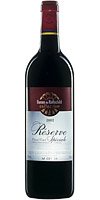Robinson from the rich gives to the poor: Domaines Barons Rothschild Réserve Spéciale 2001

The latest vintage of Bordeaux wines are being celebrated everywhere you click lately. Jancis Robinson, taking an educational and scientific approach in proclaiming her love of the 2005 crop, makes you want to care.
There's a big divide when it comes to Bordeaux. Jancis does a good job at bringing meaning to the everyday consumer. Sure, you'll hear about the fantastically expensive investments from Médoc or the earth-shattering achievements in Pomerol and that will likely go in one ear and out the other. But I really like this piece posted just today because it is so down-to-earth. No namedropping, just a timely demystification. Read it to find out why critics and vintners alike are pleased with virtually all current levels of output from Bordeaux.
FINDING YOUR OWN BALANCE IN BORDEAUX
There's another divide that Bordeaux wines present and unfortunately it lies between me and my dinner. The times that I have saved up for a rather fancy bottle, I end up feeling like it should be studied like homework rather than enjoyed with dinner. The Pauillac pictured above features exactly that kind of austere style.
It's the Domaines Barons Rothschild Réserve Spéciale Pauillac 2001 (no 2005 bottle will be appearing for some time as the 2003 reserves have now been released in Quebec). Its austerity starts with a heady aroma that doesn't give up much. There's a chalky, minerally nose; not a lot of fruit but tremendous balance of acid and earthy matter.
This wine has strong sharp edges (Jancis mentions 2001 being a particularly acidic year). Despite that, its consistency and structure is rather smooth and dignified. I guess this is what you call French elegance. Sure, there's no New World Cabernet Sauvignon attack, bold and vivid; instead you get refinement, unique and persuasive.
I eventually honed in on an interesting animal nuttiness on the palate that I have never identified in a wine before: some kind of cross between hazelnut and beef drippings. It's amazing how wines aged even longer than this one still need time to open up when you decant them.
Then on the second night I got more sauve textures. Dried fruit notes were stronger and complexity intensified. Still very full-bodied and structured. A thoughtful wine if not entirely pleasing at the dinner table -- after fixing two separate dinners to reel in this enigmatic wine I now feel like maybe the third time would be the charm. But it's too late, there's no wine left to serve.
IS BORDEAUX WORTH THE FRUSTRATION?
If a wine is ever said to be alive than I guess this one was. My rib-eye had stopped moving and it was the wine that was the moving target. This kind of dynamism garners Bordeaux its accolades but I feel a bit frustrated by it. While I got this bottle reduced (1/4 off the list price) I still had the feeling that the more you pay for a Pauillac, the less you'll be able to engage with it. Set it on a pedestal, not a dining room table.
Considering ageability factors, wine "futures", and the idea that rarity will trump quality in setting prices, the whole thing seems like too much of a gamble for the everyday wine consumer. I'm likely to avoid the exclusive appellations like Pauillac and favour the general Bordeaux one instead. I spend only $12 doing it, and am more satisfied with the whole thing.
I sound ignorant but it was in doing some research on the 1998 Bordeaux-inspired wine I wrote about in this space that I found more useful Bordeaux-buyer-beware news from Jancis:
...the cheapest wines were over £20 a bottle and the most expensive was the renowned Ch Pétrus which costs well over £1,000 a bottle. (I liked it, but no more than a wine, also served blind, that was being sold for £35 a bottle at the time of the tasting.)
Médoc, France. 12.5%







No comments:
Post a Comment